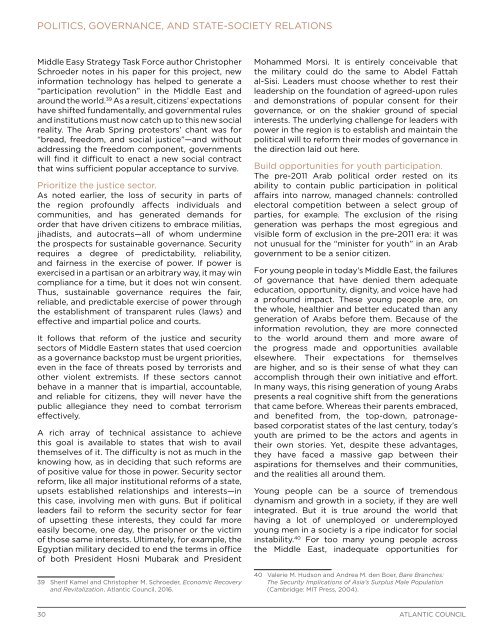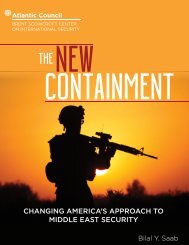POLITICS GOVERNANCE STATE-SOCIETY RELATIONS
Politics_Governance_and_State-Society_Relations_web_1121
Politics_Governance_and_State-Society_Relations_web_1121
You also want an ePaper? Increase the reach of your titles
YUMPU automatically turns print PDFs into web optimized ePapers that Google loves.
<strong>POLITICS</strong>, <strong>GOVERNANCE</strong>, AND <strong>STATE</strong>-<strong>SOCIETY</strong> <strong>RELATIONS</strong><br />
Middle Easy Strategy Task Force author Christopher<br />
Schroeder notes in his paper for this project, new<br />
information technology has helped to generate a<br />
“participation revolution” in the Middle East and<br />
around the world. 39 As a result, citizens’ expectations<br />
have shifted fundamentally, and governmental rules<br />
and institutions must now catch up to this new social<br />
reality. The Arab Spring protestors’ chant was for<br />
“bread, freedom, and social justice”—and without<br />
addressing the freedom component, governments<br />
will find it difficult to enact a new social contract<br />
that wins sufficient popular acceptance to survive.<br />
Prioritize the justice sector.<br />
As noted earlier, the loss of security in parts of<br />
the region profoundly affects individuals and<br />
communities, and has generated demands for<br />
order that have driven citizens to embrace militias,<br />
jihadists, and autocrats—all of whom undermine<br />
the prospects for sustainable governance. Security<br />
requires a degree of predictability, reliability,<br />
and fairness in the exercise of power. If power is<br />
exercised in a partisan or an arbitrary way, it may win<br />
compliance for a time, but it does not win consent.<br />
Thus, sustainable governance requires the fair,<br />
reliable, and predictable exercise of power through<br />
the establishment of transparent rules (laws) and<br />
effective and impartial police and courts.<br />
It follows that reform of the justice and security<br />
sectors of Middle Eastern states that used coercion<br />
as a governance backstop must be urgent priorities,<br />
even in the face of threats posed by terrorists and<br />
other violent extremists. If these sectors cannot<br />
behave in a manner that is impartial, accountable,<br />
and reliable for citizens, they will never have the<br />
public allegiance they need to combat terrorism<br />
effectively.<br />
A rich array of technical assistance to achieve<br />
this goal is available to states that wish to avail<br />
themselves of it. The difficulty is not as much in the<br />
knowing how, as in deciding that such reforms are<br />
of positive value for those in power. Security sector<br />
reform, like all major institutional reforms of a state,<br />
upsets established relationships and interests—in<br />
this case, involving men with guns. But if political<br />
leaders fail to reform the security sector for fear<br />
of upsetting these interests, they could far more<br />
easily become, one day, the prisoner or the victim<br />
of those same interests. Ultimately, for example, the<br />
Egyptian military decided to end the terms in office<br />
of both President Hosni Mubarak and President<br />
39 Sherif Kamel and Christopher M. Schroeder, Economic Recovery<br />
and Revitalization, Atlantic Council, 2016.<br />
Mohammed Morsi. It is entirely conceivable that<br />
the military could do the same to Abdel Fattah<br />
al-Sisi. Leaders must choose whether to rest their<br />
leadership on the foundation of agreed-upon rules<br />
and demonstrations of popular consent for their<br />
governance, or on the shakier ground of special<br />
interests. The underlying challenge for leaders with<br />
power in the region is to establish and maintain the<br />
political will to reform their modes of governance in<br />
the direction laid out here.<br />
Build opportunities for youth participation.<br />
The pre-2011 Arab political order rested on its<br />
ability to contain public participation in political<br />
affairs into narrow, managed channels: controlled<br />
electoral competition between a select group of<br />
parties, for example. The exclusion of the rising<br />
generation was perhaps the most egregious and<br />
visible form of exclusion in the pre-2011 era: it was<br />
not unusual for the “minister for youth” in an Arab<br />
government to be a senior citizen.<br />
For young people in today’s Middle East, the failures<br />
of governance that have denied them adequate<br />
education, opportunity, dignity, and voice have had<br />
a profound impact. These young people are, on<br />
the whole, healthier and better educated than any<br />
generation of Arabs before them. Because of the<br />
information revolution, they are more connected<br />
to the world around them and more aware of<br />
the progress made and opportunities available<br />
elsewhere. Their expectations for themselves<br />
are higher, and so is their sense of what they can<br />
accomplish through their own initiative and effort.<br />
In many ways, this rising generation of young Arabs<br />
presents a real cognitive shift from the generations<br />
that came before. Whereas their parents embraced,<br />
and benefited from, the top-down, patronagebased<br />
corporatist states of the last century, today’s<br />
youth are primed to be the actors and agents in<br />
their own stories. Yet, despite these advantages,<br />
they have faced a massive gap between their<br />
aspirations for themselves and their communities,<br />
and the realities all around them.<br />
Young people can be a source of tremendous<br />
dynamism and growth in a society, if they are well<br />
integrated. But it is true around the world that<br />
having a lot of unemployed or underemployed<br />
young men in a society is a ripe indicator for social<br />
instability. 40 For too many young people across<br />
the Middle East, inadequate opportunities for<br />
40 Valerie M. Hudson and Andrea M. den Boer, Bare Branches:<br />
The Security Implications of Asia’s Surplus Male Population<br />
(Cambridge: MIT Press, 2004).<br />
30 ATLANTIC COUNCIL



